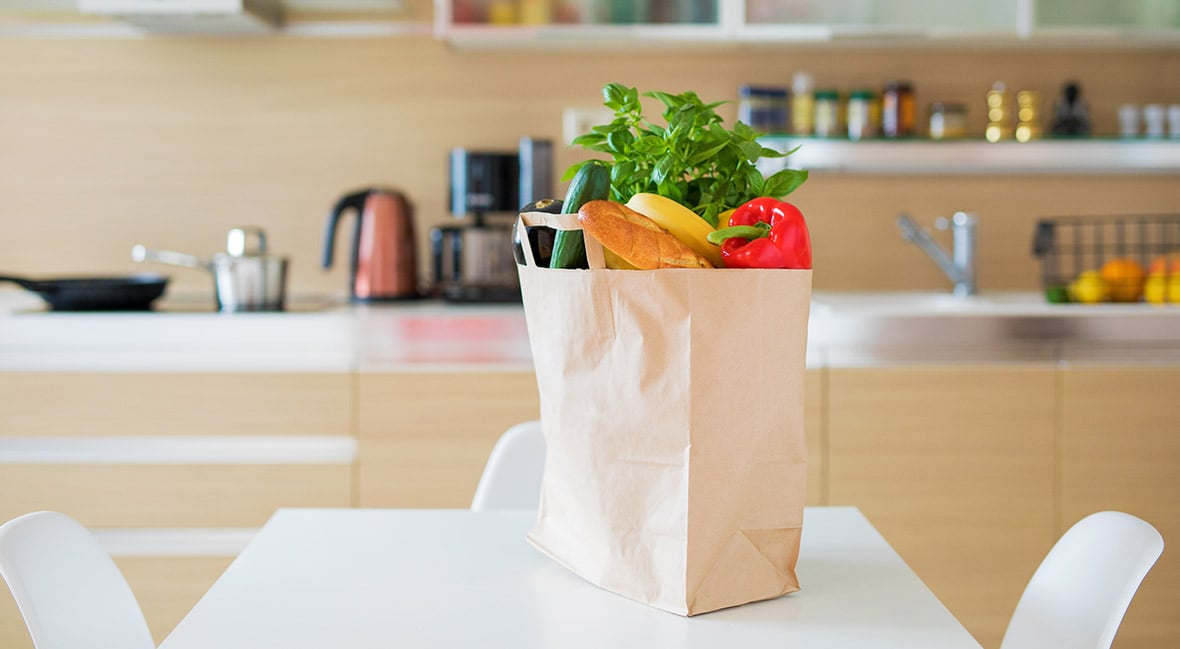The COVID-19 pandemic has chased everyone indoors and limited our ability to do day-to-day tasks, such as grocery shopping. For some, this is simply an inconvenience, but if you’re one of the 60 to 70 million Americans living with a digestive disease, limited access to food can have serious consequences for your health and well-being.
The pandemic can trigger digestive problems thanks to increased stress, decreased access to special foods, and even COVID-19 itself.
It’s important to prevent any flare-ups of inflammatory bowel disease (IBD), gastroesophageal reflux disease (GERD), or celiac disease that could require in-person medical care, so here’s how to maintain your digestive health during lockdown.
First and foremost: Take care of your mental health and stress levels.
Stress is an immunosuppressant: It can have adverse effects on everything from your ability to sleep and heal to your immune system.
It’s especially detrimental to people with digestive problems such as IBS and GERD.
During a global health event as traumatic as COVID-19, it’s therefore critical you take care of your mental health and try to keep your stress levels as low as possible.
Here are several best practices to help you do so:
- Do some short, guided meditations and deep stretches, which studies show can increase mindfulness and decrease stress. If you’re not sure where to start, use a resource like Headspace, which is a meditation app with a blog full of resources. According to the Mayo Clinic, even five minutes a day can make a world of difference in your stress levels, and can even help manage symptoms of digestive diseases, including IBS.
- Limit how much news you read. Being informed about the pandemic is important, but information overload can cause anxiety and exacerbate depression.
- Practice social distancing. Stay at least six feet from people who don’t live in your household, wear a mask in public, and frequently wash your hands with soap and warm water for at least 25 seconds. Knowing that you’re taking care of yourself and others and minimizing the chances of contracting the virus will help keep your stress levels low.
- Exercise whenever possible. Regular exercise is clinically proven to reduce stress, plus it functions as “moving meditation,” according to the Mayo Clinic. You don’t have to lift heavy weights or run five miles; walking around your neighborhood, or doing yoga or high-intensity interval training (HIIT) workouts in your home are all great stress relievers—and you can do them for free.
- Avoid alcohol. This has two-fold importance: Alcohol can not only suppress your immune system and trigger both IBD and GERD, it’s also a depressant, which can exacerbate stress, anxiety, and depression.
Buy specialty food straight from the source.
If you’ve seen the news in the last few weeks, you know that grocery shelves across the country are being picked over, and then some. If you’re having trouble sourcing specialty items that you need for your digestive health, go straight to the source.
For example, whole-grain foods producer Bob’s Red Mill sells all of its flours, grains, and snacks online, and customers can have items shipped directly to their homes. Those having trouble sourcing fresh produce can also sign up for a Community Supported Agriculture (CSA) program: Pay a fee and receive a box of fresh, local, seasonal produce each week. (This has the added benefit of supporting a local business.) You can do the same with animal proteins via a CSA-style butcher box. Just google “local butcher + your location.”
There are plenty of workarounds for continuing to eat well despite the sparse supermarket shelves.
Make food in bulk, and make it ahead of time.
One of the most challenging aspects of this lockdown is fighting to keep your motivation. There will be days when you don’t have the energy (or, depending on your situation, the time) to make food, and that’s understandable and completely normal.
We recommend that you batch-cook food that is gluten-free if you’re celiac, low fermentable oligo-, di-, mono-saccharides and polyols (FODMAP) if you have IBD, and limit acids and other trigger foods if you suffer from GERD. Treat this like meal prepping, and carve out one day to make several batches so you’ll always have something healthy to reach for.
If and when the time comes that you just don’t feel like making dinner for the tenth night in a row, you can dig into your freezer and pull out a fresh, homemade, digestion-friendly meal.
Several gluten-free options that are easy to make ahead of time and freeze:
- Kale Quiche With Sweet Potato Crust: You can easily double the recipe and make enough breakfast to last a family for an entire week, or eat one and freeze the other.
- Slow Cooker Sesame Chicken: Served on rice, this dump meal is as easy as throwing ingredients in a pot and leaving them to do their thing. You can, once again, double the recipe and toss leftovers straight into the freezer for future meals.
- Vegetarian Enchiladas: Filling, decadent, and healthy, you can customize these gluten-free enchiladas to your tastes.
- Pull-Apart Cinnamon Rolls: Make ahead, and enjoy a decadent little weekend treat when you need it most.
Low FODMAP options:
- Cranberry Walnut Oatmeal: Filling and easy to make ahead, this breakfast dish is full of flavor, without risking your health.
- Tomato & Spinach Frittata: This recipe was made with meal prep in mind. You can add veggies as you see fit (mushrooms, onions, and peppers, oh my), and refrigerate or even freeze the goods for a delicious, filling, and healthy breakfast.
- Creole Blackened Chicken: Make as much or as little of this dish as you want and serve with the side dishes of your choice, or even wrapped in tortillas as a spicy taco filling.
- Pasta Primavera: Delicious hot or cold, this one-pot meal is easy to make and customize to your taste preferences.
GERD-friendly options:
- Butternut Squash Mac ‘n’ Cheese: Managing GERD doesn’t have to be miserable. You can still enjoy comfort food, like this creamy mac and cheese that makes a few smart substitutions. Sub the whole milk with 1 percent to really make it GERD-proof.
- Chicken Parmesan: With a few smart substitutions (such as egg whites and low-moisture, low-fat mozzarella) you can enjoy comfort food that also keeps well in the fridge for future sandwiches. If you’re really sensitive to acid, use this tomato-free marinara sauce recipe.
When you order out, make smart substitutions.
The fact of the matter is that cooking every meal, every day is a tall task, and it’s okay to get takeout, so long as you limit how often you do it, and you do it smartly.
That means if you suffer from GERD but really want pizza, either go light on the acidic red sauce or avoid it completely, subbing in olive oil or even white sauce.
If you’re gluten-free, make sure you call the restaurant ahead of time and ask if they’re celiac friendly. For some restaurants with a gluten-free menu, there’s still cross-contamination. For example, many pizza places that offer gluten-free crust don’t have separate stations for GF options, so flour is flying everywhere and could contaminate your meal.
Keep in touch with your gastroenterologist if you have any concerns.
If you have any concerns about your gut, whether you’re experiencing symptoms like gas, bloating, or changes in your stool, you should always contact your gastroenterologist. We currently provide telemedicine, with remote appointments guaranteeing you receive expert care from the safety and comfort of your home.












